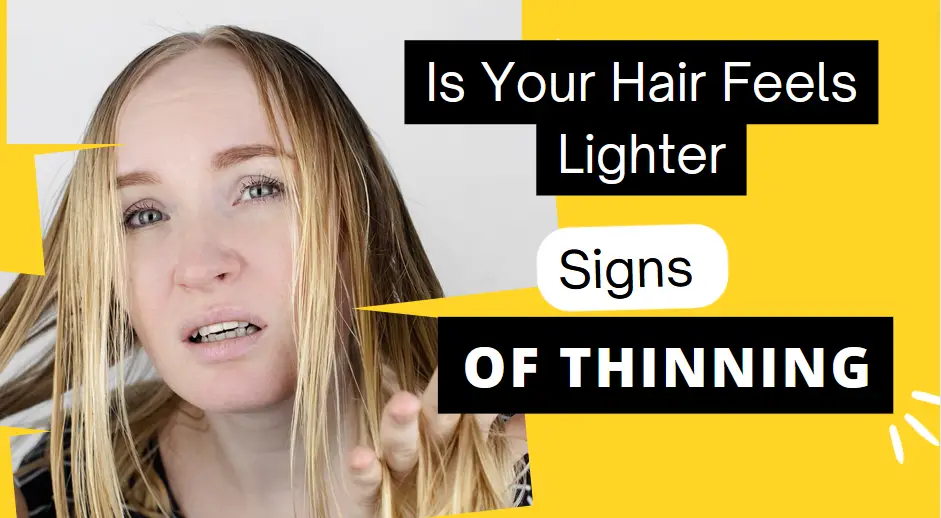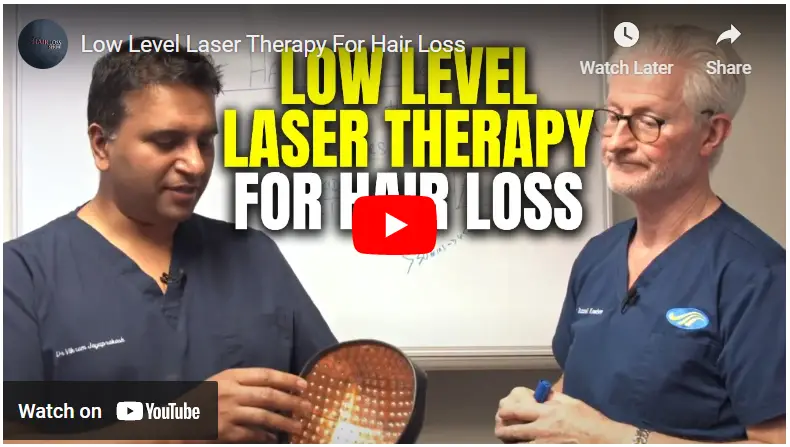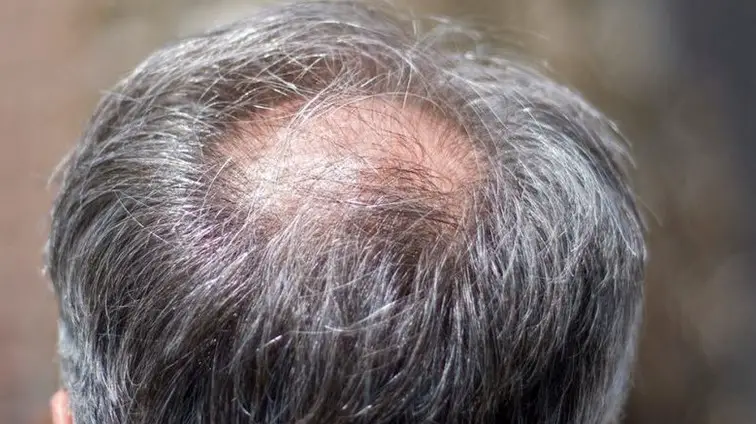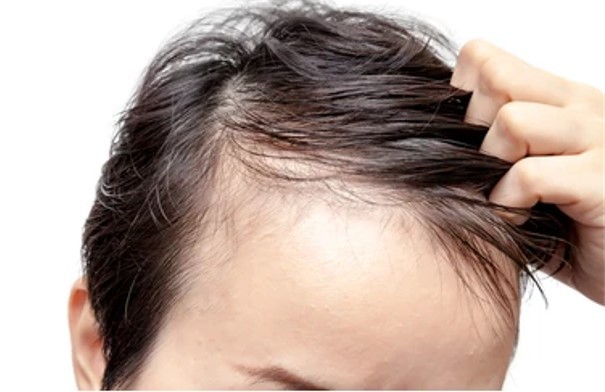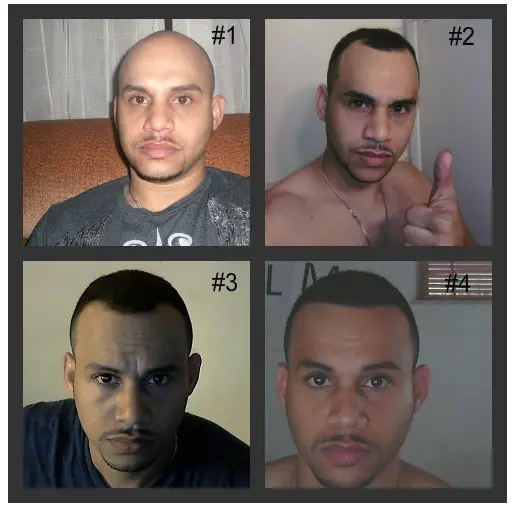Are you noticing signs your hair is thinning? Thinning hair can be a distressing experience for both men and women, so it’s important to understand the causes and possible treatments.
In this blog post, we will discuss how to tell if you have thinning hair, the potential causes of thinning hair, and potential treatment options. Keep reading to find out more information about thinning hair.
Overall thinning hair is often confused with hair loss, but the two are not the same. Thinning hair occurs when the individual hairs on your scalp become thinner and weaker over time, while hair loss involves complete bald patches or an overall reduction in the number of hairs on your head.
So, How to Tell if You Have Thinning Hair
There are a few signs to look out for. One way is to observe the area around your part line. If it’s getting wider and harder to cover up with the rest of your hair, then you may be experiencing thinning.
Additionally, if you’re starting to notice more of your scalp when styling your hair and you can no longer cover it up as easily, then you should pay attention to this sign of thinning hair.
Excessive shedding is also another common symptom of thinning hair. If you find yourself losing significantly more strands than normal when you brush your hair or notice hair loss in shower, it could be a sign that your locks are becoming thinner.
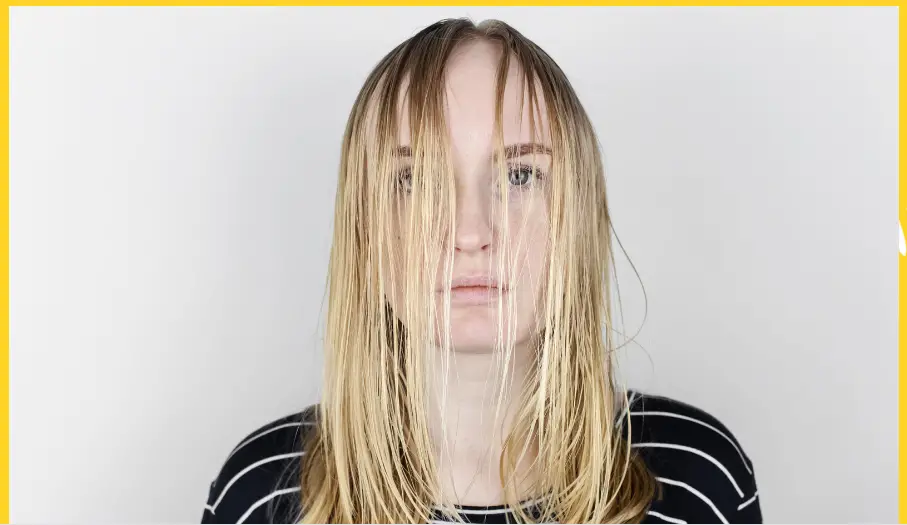
Other signs of thinning hair?
Thinning hair can be a cause of concern for many people. Here are some other signs to look out for to determine if you have thinning hair:
1. Noticeable hair loss: If you see more hair than usual in your shower drain, on your pillow, or in your hairbrush, it may be a sign of thinning hair.
2. Reduced hair volume: If your hair appears less dense or thinner than before, it may indicate that your hair is thinning.
3. Widening part: If you notice that your part is widening or that your scalp is becoming more visible, it may be a sign of thinning hair.
4. Receding hairline: If you notice that your hairline is receding, especially around the temples or forehead, it may be an early sign of male pattern baldness.
5. Thinning ponytail: If your ponytail is becoming thinner, or you’re finding it harder to style your hair, it could be due to thinning hair.
5. Itchy or irritated scalp: If you have an itchy or irritated scalp, it could be a sign of thinning hair, as hair loss can cause scalp irritation.
If you’re experiencing any of these symptoms above and suspect that you have thinning hair, then it’s important to talk to a doctor. They will be able to provide advice and treatment options to help restore your hair’s thickness. Additionally, they can also help determine whether a vitamin deficiency is causing your hair loss and prescribe appropriate hair growth supplements to help get back on track.
If you think that you’re dealing with thinning hair, there are treatments available to help regrow thinning hair in both males and females. From topical solutions like Minoxidil to laser therapy and dietary supplements, there are several ways to support healthy hair growth and reduce the appearance of thinning.
It’s important to remember that these treatments aren’t instant fixes, so be sure to keep track of your progress and follow treatment instructions carefully. With the right combination of treatments, you can help maintain or restore the health of your hair.
More about treatment options for thinning hair so continue reading.
What are the causes of thinning hair?
Thinning hair can be caused by a variety of factors, including lifestyle habits, genetics, or a combination of both. Certain medical conditions such as thyroid problems, anemia, and polycystic ovary syndrome can also contribute to thinning hair.
There are a few lifestyle habits that may cause thinning hair:
- Over-treating hair: with color treatments, perms, and relaxers can damage the hair follicles and cause them to weaken, leading to hair loss.
- Using harsh hair products: like shampoos and conditioners with strong chemicals can also strip the hair of natural oils and lead to breakage and thinning.
- Hairstyles that pull tightly on the scalp: such as ponytails, braids, and buns, can cause traction alopecia, which is hair loss due to the constant pulling of the follicles.
- Stress: can also have a big impact on the quality of your hair as it can cause excessive shedding and weakening of the hair follicles.
- Genetic factors: are responsible for some cases of thinning hair, especially when it runs in the family.
- Hormonal changes: can also cause hair to become thinner. For example, many women experience thinning hair during menopause due to decreased levels of estrogen.
- Nutritional deficiencies: can lead to thinning hair as well. In addition, not getting enough vitamins and minerals in your diet, such as biotin, iron, and Vitamin C can affect the health of your hair.
- Medications: Certain medications can also cause thinning hair as a side effect.
- Health conditions: Health conditions such as thyroid disorders and autoimmune diseases can also contribute to thinning hair.
- Environmental factors: Lastly, environmental factors such as heat styling and chemical treatments can weaken hair and lead to thinning.
If you think any of these factors might be contributing to your thinning hair, you should talk to your doctor to determine the best course of action for treating it.
Note: if your hair is becoming noticeably finer or thinner than usual, or if your part is getting wider. You may also notice that your hair feels thinner and that you can see more of your scalp. If you’re experiencing any of these signs of hair loss, it’s best to consult with a doctor or healthcare professional to determine the cause of thin crown hair loss. They can help you develop an effective treatment plan for how to regrow thinning hair, female or male, including lifestyle modifications, medications, and supplements.
What are the treatment options for thinning hair?
There are a variety of treatments available to help address thinning hair, from over-the-counter solutions to prescription medications to lifestyle changes.
Over-the-counter solutions include minoxidil, which is available in liquid and foam form, and hair-thickening products such as DHT blocker shampoos, conditioners, and styling products.
Prescription medications that may be used to treat thinning hair include finasteride and spironolactone.
Home treatments
Thinning hair is a common concern for many people, but it’s important to consult with your doctor before trying any at-home treatments. Here are twelve options you may consider:
Scalp massage – This is an affordable and accessible option that can help increase blood flow to the scalp. Gently apply pressure with your fingertips while washing your hair to promote circulation. You can also use a handheld scalp massager to remove dead skin cells.
Essential oils – While animal research suggests effectiveness, there is not enough evidence to confirm their benefits for treating baldness or thinning hair. If you decide to use essential oils, make sure they are diluted in a carrier oil to avoid allergic reactions.
Anti-thinning shampoo – These Shapiro MD shampoos can provide volume for your hair and contain vitamins and amino acids to promote a healthier scalp. Follow the directions for the best results.
Multivitamins – Nutritional deficiencies can cause hair loss, so a daily multivitamin may help address this issue. However, avoid taking extra vitamins if you are already getting the nutrients you need.
Folic acid supplements – Some studies suggest that folate deficiency may be associated with hair loss, but there is not enough evidence to confirm its effectiveness.
Biotin – This water-soluble nutrient is naturally found in certain foods, but supplemental forms are available over the counter. However, there is little evidence that Biotin gummies can help with thinning hair.
Omega-3 and omega-6 fatty acids – These essential fatty acids can help fight inflammation, which may be an underlying cause of hair loss. Talk with your doctor about taking a supplement if you don’t normally consume foods that contain these nutrients.
Minoxidil – This over-the-counter hair loss treatment is approved by the FDA and can gradually thicken hair in balding spots. Consistent use is necessary to see results, but scalp irritation and unwanted hair growth on the face and neck are possible side effects.
Spironolactone – This prescription medication may treat thinning hair caused by excess aldosterone hormones.
Finasteride – This prescription medication is the first FDA-approved oral medication for male hair loss. It is generally not recommended for females who are pre-menopausal.
Corticosteroids – These prescription treatments can help control inflammation linked to autoimmune-related hair loss.
At-home laser therapy – The FDA has cleared some products for at-home use, but they can be pricey and may take several months to work. Talk with your doctor before investing in an at-home laser therapy machine.
Other Treatment
If these treatments do not have the desired effect, there are more invasive options available. Hair restoration procedures such as hair transplants and scalp micro pigmentation are available for those looking for a more permanent solution.
For those who are looking for an alternative to transplants and scalp micropigmentation, low laser light therapy is a non-invasive option that can help to stimulate new hair growth.
Note: No matter what treatment option you choose, it is important to talk to your doctor to make sure it is the right one for you. Your doctor will be able to advise you on the best course of action How to Tell if You Have Thinning hair male or female.
If you have any questions about; why is my hair thinning or just fine, which vitamin deficiency causes hair loss, why is my losing hair at 25 male, signs of balding at 20, why is my hair is so thin I can see my scalp, hair feels thinner than before, and why am I seeing wide thin hair part? The doc. can help you find a solution that works for you.
Hair loss prevention
In addition to these medical treatments, lifestyle changes can help to address thinning hair and prevent hair loss. Eating a healthy diet with plenty of protein, vitamins, and minerals is important for maintaining healthy hair.
Additionally, reducing stress and avoiding activities like smoking or excessive alcohol consumption can help.
Here are some additional hair loss prevention tips:
Use a gentle shampoo: Harsh shampoos and conditioners can strip your hair of its natural oils, which can lead to breakage and hair loss. Look for shampoos and conditioners that are gentle and designed for your hair type.
Be gentle when washing and drying your hair: Avoid vigorous rubbing or pulling of your hair when washing and drying it. Instead, pat your hair dry with a soft towel and avoid using hot water to wash your hair.
Protect your hair from the sun: Exposure to the sun’s rays can damage your hair and make it more prone to breakage. Wear a hat or use a leave-in conditioner with SPF protection to help protect your hair from the sun.
Avoid harsh chemical treatments: Chemical treatments like hair dye, perms, and straightening can damage your hair and cause it to break. If you do use chemical treatments, be sure to follow the instructions carefully and consider seeing a professional stylist.
Get enough sleep: Lack of sleep can contribute to stress, which can lead to hair loss. Aim for 7-8 hours of sleep per night to help keep your stress levels in check and promote healthy hair growth.
Exercise regularly: Regular exercise can help improve blood flow and circulation, which can promote healthy hair growth. Aim for at least 30 minutes of exercise per day, such as brisk walking or jogging.
Consider using hair growth products: There are a variety of hair growth products on the market, such as topical minoxidil and finasteride, which may help slow or reverse hair loss. Talk to your doctor or a dermatologist to see if these products may be right for you.
Conclusion
It is normal to lose hair every day, with the average person losing between 50-100 strands. If you are noticing more hair falling out than usual or you have thinning patches of hair, you may be experiencing thinning hair. The good news is that thinning hair can often be reversed with proper treatment. Generally, it takes an average of 3-4 months for the hair to grow back after thinning, so patience is key.
Stress can also cause thinning hair. If this is the case for you, try taking steps to reduce your stress levels such as yoga, meditation, or deep breathing exercises. Additionally, there are some home remedies that can help reduce thinning hair. Some popular options include scalp massage with essential oils like peppermint or lavender, using natural ingredients like aloe vera or coconut oil, or using herbs like rosemary or hibiscus.
The first signs of balding usually appear around the temples and crown area, but can also be seen along the hairline or at the back of the head. It is normal to see your scalp through your hair, both male and female, when you lift it up or in bright light. However, it is not normal to have more than one-third of your scalp visible under normal conditions. If your hair feels thinner or you can easily see your scalp even when you haven’t lifted your hair up, this could be a sign of thinning hair.
Vitamin deficiency can also cause hair loss, with iron deficiency being the most common cause. If you think you may have a vitamin deficiency, consider talking to your doctor about taking a supplement to help address the issue.
No matter what the cause is, it is important to take action to prevent further thinning and promote hair growth.
FAQs: How to Tell if You Have Thinning Hair
Q1. Can hair thinning be reversed?
A1. Yes, hair thinning can be reversed with proper treatment.
Q2. What is the best treatment for hair thinning?
A2. The best treatment for hair thinning depends on the underlying cause of the problem. Topical treatments, prescription medications, and hair transplantation can be effective.
Q3. Can stress cause hair thinning?
A3. Yes, stress can cause hair thinning by disrupting the normal hair growth cycle.
Q4. How long does it take to see results from hair thinning treatment?
A4. The time it takes to see results from hair thinning treatment varies depending on the treatment option and the individual.
Q5. Is hair thinning permanent?
A5. Hair thinning may be permanent if the underlying cause is not addressed. However, with proper treatment and care, hair thinning can be reversed or slowed down.
Q6. Can hair thinning be prevented?
A6. While hair thinning cannot always be prevented, lifestyle changes such as a balanced diet, managing stress, and avoiding harsh hair treatments can help maintain healthy hair.
Q7. Can hair thinning be a sign of a more severe medical condition?
A7. Yes, hair thinning can be a sign of an underlying medical condition, such as a thyroid problem or autoimmune disease. It’s important to consult a healthcare professional if you experience sudden or severe hair thinning.
Reference
Sure, here are some websites that you can refer to for more information on hair thinning:
- American Academy of Dermatology Association: https://www.aad.org/public/diseases/hair-loss
- National Institute of Arthritis and Musculoskeletal and Skin Diseases: https://www.niams.nih.gov/health-topics/hair-loss
- American Hair Loss Association: https://www.americanhairloss.org/
- International Society of Hair Restoration Surgery: https://www.ishrs.org/
- WebMD: https://www.webmd.com/skin-problems-and-treatments/hair-loss/understanding-hair-loss-basics
- Mayo Clinic: https://www.mayoclinic.org/diseases-conditions/hair-loss/symptoms-causes/syc-20372926
- National Institutes of Health: https://www.ncbi.nlm.nih.gov/books/NBK278957/
- Healthline: https://www.healthline.com/health/thinning-hair
- Medical News Today: https://www.medicalnewstoday.com/articles/327229
- DermNet NZ: https://dermnetnz.org/topics/hair-loss/
We advise consulting with a healthcare professional for personalized advice and treatment options.
- AI Powered Bald Filter Online 2024: See Yourself with No Hair! - January 19, 2024
- Harklinikken Bad Reviews 2024: Analyzing Negative Feedbacks - January 18, 2024
- How to Get the Alex Eubank Hair | Step-By-Step Tutorial 2024 - January 18, 2024

